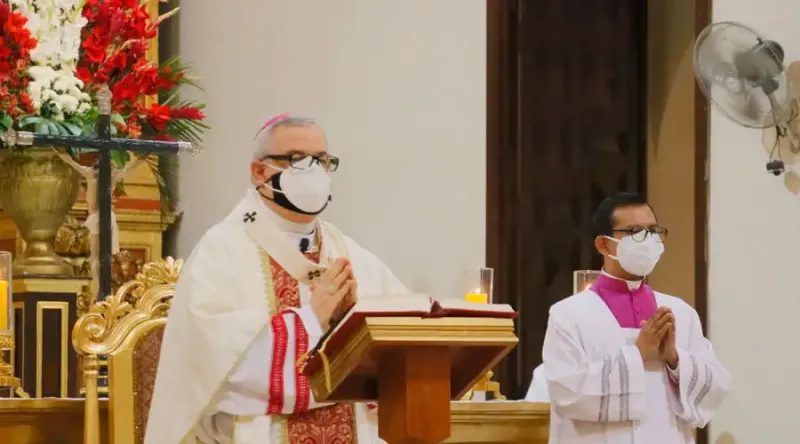
Piura, Peru, Jul 28, 2021 / 16:01 pm (CNA).
The Archbishop of Piura on Tuesday encouraged working for unity in Peru and reminded the faithful that neither hatred nor violence are the way to the future, as the nation celebrates its bicentennial.
“Without denying the seriousness of many problems and the injustice of many situations, it is essential to proclaim that hatred and violence are never the way,” Archbishop José Antonio Eguren Anselmi preached July 27 during a Mass celebrated for the Peruvian bicentennial at the Piura cathedral.
Peru declared its independence from Spain July 28, 1821.
Archbishop Eguren declared in his homily that “only love and constructive personal effort can get to the bottom of problems. Hence the importance of rejecting today and always, all forms of violence that are always anti-Christian, and any ideology that has hatred and struggle as engines of history and as false means to achieve social justice.”
The archbishop said that “the current situation we are living in has once again exposed, with painful rawness, the greatest weakness that Peruvians have: disunity.”
“Today it pains us to see a country divided, in confrontation, polarized and agitated, and what’s most dangerous, threatened in its democratic coexistence and in its fundamental freedoms by a totalitarian minority,” he lamented.
Peru has been in political crisis in recent years. A two-round presidential election was recently won by Pedro Castillo of Free Peru, a socialist party, by a margin of fewer than 45,000 votes.
In his homily, Archbishop Eguren explained that “authentic unity is only achieved in the truth, never in lies. Lying only leads to disunity, mistrust, violence, confrontations, and moral and economic poverty. Only in the truth can one live and govern, never in falsehood and deception,” which is why it is “so important that the electoral processes are clean and transparent.”
The archbishop said that “unity is achieved when politics is conceived as an eminent form of charity and service, and through it the dignity of the human person is promoted and defended, with all its demands, including the transcendent and eternal, and not as a way to achieve power to serve one’s own or ideological horizons.”
The Archbishop of Piura stressed that unity is achieved “when rulers and politicians are aware that undermining faith in God, and not respecting the human right to religious freedom in the long run turns against man himself and against fraternal human coexistence, and in the case of Peru, it turns against its national identity, since our country is a Christian people, identified with Christ and his Mother, the Virgin Mary.”
“We beg Jesus Christ, the Lord of History, to bless, protect, and in the current circumstances, unite, defend and heal our beloved Homeland, from the delicate situation we live in, where the critical health situation that still affects us and has been aggravated by the moral evil of many, all of which strikes the poorest with special cruelty,” Archbishop Eguren continued.
“We remember today in our prayers, the more than 195,000 Peruvians who have died during the pandemic. Never again should a genocide such as the one we have experienced happen among us, which has surpassed all the combined deaths from ten years of terrorism and those of the War of the Pacific,” he said.
Archbishop Eguren remarked that José de San Martín, the liberator of Peru, “would tell us today that we should reject all forms of totalitarianism,” which is an “ominous system where a political group usurps the role of the sole guide, as well as the freedom of persons-citizens, and man and the people become objects, notwithstanding all the verbal declarations and promises.”
“In totalitarianism, a political group seeks to perpetuate itself in power, as well as to violate the right of the people to elect their own rulers through free and fair elections,” he stated.
“Likewise, the state ceases to be ‘our common home’ where everyone can live according to the principles of fundamental equality, and is transformed into a tyrant state that claims to be able to dispose of people’s lives, in the name of public utility, which is nothing else, in reality, but the search for interest and privileges for a privileged caste.”
Archbishop Eguren added that San Martín would surely also “ask us today to work for a Peru freed from the scourge of corruption, that which weakens democracy and its institutions, and that, although it affects us all, especially affects the poorest and most needy.”
“Dear brothers: In this celebration of the bicentennial, and despite all that we have and are experiencing, let us not allow ourselves to be robbed of the hope and the joy that springs from our faith in the Lord and who gives us the strength to live. Let us never think that our work and efforts down here are completely useless.”
The archbishop stressed that Peruvians “have the highest responsibility to build a just and reconciled Peru where the spirit of the Beatitudes is lived.”
If you value the news and views Catholic World Report provides, please consider donating to support our efforts. Your contribution will help us continue to make CWR available to all readers worldwide for free, without a subscription. Thank you for your generosity!
Click here for more information on donating to CWR. Click here to sign up for our newsletter.




Leave a Reply